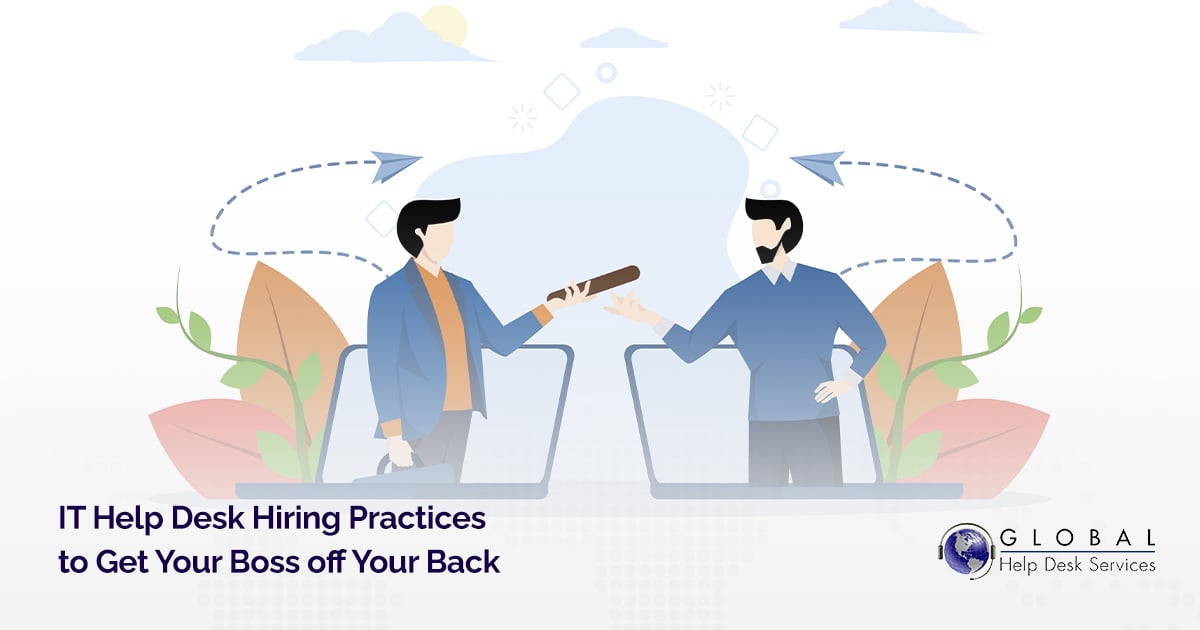If you’re reading this right now, the damage has likely already been done.
One of your help desk employees dropped the ball and a caller left without their issue resolved.
They’re frustrated. They’re upset. And they’re already spreading the word, telling everyone they can about their bad experience. It’s simply human nature to want to vent in these situations: In fact, customers tend to tell nine people about a positive customer service experience, but 16 about a bad one.
And who has the CEO tasked with fixing this mess?
You.
Why So Many IT Help Desks Are Struggling
Every IT help desk gets a tough call now and then.
But if your help desk is flailing and callers are unhappy, it’s likely a symptom of a much larger problem: The people you hired simply don’t have the right skills for the job, even if they looked great on paper.
But it’s not your fault. This is a widespread industry problem:
- Turnover rates at call centers and help desks — an average of 40%! — can make it hard to even identify skills gaps, let alone address them.
- Add to that the ongoing tech talent shortage, which puts extra pressure on teams to compete for a narrow talent pool.
- As a result, help desks grab whoever has satisfactory tech qualifications, but agents aren’t on the job long enough to get the missing pieces of training and experience they need to ensure caller satisfaction.
And … we’re back at the beginning of our story, with a chaotic help desk, upset customers, and an angry boss glued so tight to your hindquarters, he could moonlight as a diaper. It's a vicious cycle and one of the top challenges IT help desks face.
The root of this problem? You may not be looking for the right skillsets when you hire.
The good news is you’re in the right place.
The better news? Once you know the key skillsets to hire for, you can find, nurture, and grow people who will stick around longer and delight all your callers in the process.
The best news? There are more people out there with those key skillsets than you think. Training’s changed. Qualifications have changed. And your IT help desk job descriptions and hiring practices might be turning away potential superstars.
We can help you change that. With our years of experience providing help desk services across a variety of industries, Global Help Desk Services, Inc. (GHDSi) can give you the advice you need to spot, nurture, and grow the right skillsets that will get you an amazing help desk … and finally get your boss off your back(side).
Let’s dive into how you can find, nurture, and grow the right people for your IT help desk through these stages:
- IT help desk hiring
- IT help desk training
- IT help desk quality assurance and metrics
IT Help Desk Hiring: Finding the Right People
It starts with hiring the right people. At GHDSi, we look for applicants who meet these minimum standards.
Education level
Does the job-seeker understand the technology the callers are using? They won’t be able to answer questions about tools they’ve never used.
If they haven’t used the exact platforms our customers are using, we look for experience using similar programs. We can train them in the similarities and differences so they can speak with authority about the callers’ problems. Required education levels in our help desk job descriptions vary by client need. Some require three to five years of experience and a degree or relevant certifications, while others are more entry-level with mostly on-the-job training.
Experience
Just because applicants have the knowledge of how a certain program works doesn’t mean they have the interpersonal skills needed to relay that information to a caller in a professional, helpful way.
We look for experience working at another help desk or in customer service, but we dive deeper. A few things we evaluate are their honesty, work ethic, and whether they will bring unity to the help desk team, or not. We also evaluate each piece of their work history to determine what is true and what is not, why they left one job for the next, and how frequently they moved between jobs. Sure, it’s nice to see some technical certifications or prior technical experience to at least establish a technical aptitude, but a technical skillset is only one piece of the puzzle.
Emotional Intelligence
By the time a caller picks up the phone to ask for help, they’re already in a bad mood. They’re frustrated and upset. So, our agents need to de-escalate the situation and not take the caller’s mood personally. They need to take ownership of the problem, take accountability for solving it, and come up with a solution as quickly as possible, all while remaining calm.
Are you evaluating candidates for Emotional Intelligence (EI or EQ)? You should be. Emotional Intelligence (EI or EQ) has four times more impact on someone’s success than simple IQ does. What is EQ? Simply put, it measures someone’s self-awareness, self-control, motivation, social awareness, and social skills. If you agree that the help desk is the face of your IT group, then evaluating a candidate’s EQ should be a priority.
Evaluating EQ is where you may find a superstar. If you find someone with great customer service, strong emotional intelligence, and a good technical aptitude, you may find them to be the diamond in the rough — and better suited than a candidate with a certification (or the technical guru who fixes problems but drives callers away by making them feel stupid). That’s why we look for agents who already have emotional intelligence. If they have a technical aptitude, we usually can teach them everything else.
More about hiring: Top 3 Questions To Ask When Hiring IT Support Outsourcing Agents
IT Help Desk Training: Getting New Hires Up to Standard
But we don’t stop at hiring the right people. We also focus on training them to ensure they maintain the skillset needed for each of our clients. We don’t want generalists who know a little bit about everything. We want our agents to be specialists in the field you’re in or the technology you use.
So, our staff receive training in customer service, security awareness, compliance adherence, and specifics of your business needs and support. We also review training regularly to ensure it’s up to date and offer refresher training as agents need it. Our staff also take compliance and security training courses once a year.
Onboarding times vary from weeks to months depending on the types of knowledge each of our clients requires, but the process usually includes:
- Customer service training
- Technical training
- Account training
- Compliance training
- Software and systems training
- Call training with good and bad call examples
- Shadowing a senior agent
- Taking calls while being monitored by a supervisor
- Taking calls independently
IT Help Desk Quality Assurance and Metrics: Upholding Best Practices
Why do we put so much effort into training? Because after the call has been picked up, it’s too late. You’ve already exposed an agent to callers, and their experience is a reflection of your brand. But if an agent isn’t handling calls correctly, our quality assurance process is designed to catch it as soon as possible. The process includes:
- Reviewing tickets and calls to nip poor behavior in the bud as soon as possible
- Correcting issues in real-time
- Analyzing whether the agent is a fit for the needs of the client
- Reassigning the agent or focusing them on a single account as needed
Read more: Outsourced IT Support Services: 10 Steps to Better Quality Assurance
IT Help Desk Metrics: Evaluating Success
No two of our clients have the exact same needs. So, our metrics for agent success vary for each client. But there are some best practices we look for agents to exhibit:
- The ability to listen to the conversation while entering the necessary facts into our system. Doing it after the call means missing important details and delaying answering the next call, which will drive down their total call numbers.
- Transcribing the conversation while it’s happening. Callers don’t want to wait in silence for you to type every other sentence.
Later, other metrics like resolution rates, calls per agent, and customer satisfaction scores come in so we can get a better understanding of how each agent is handling the calls for each of our clients.
Want better agent performance? Read this: Four Ways to Improve Help Desk Performance With Better Communication
By ensuring our agents are well-equipped to answer callers’ questions, we keep the callers satisfied, our clients happy, and their CEOs off their backs. Want the same for your callers? Get in touch with us.
Facing another help desk challenge? See how we handle it.


